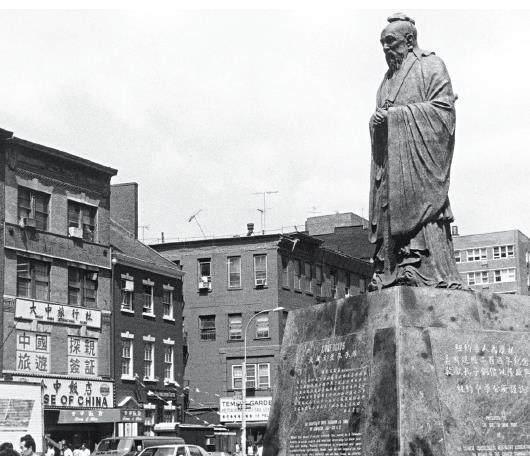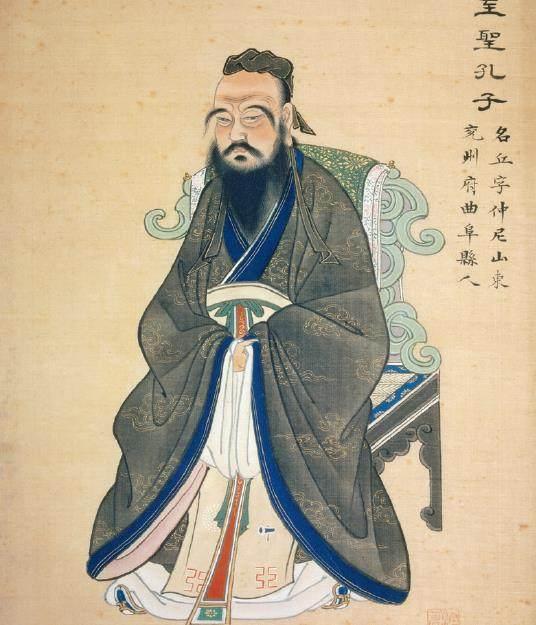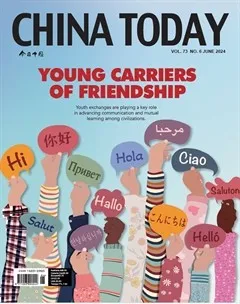Confucius and American Democracy
ALFRED HORNUNG


The rapturous reception of Confucius' works and historicalexamples of a productive exchange between China andthe West may serve as a model for contemporary relationsof China and the U.S. in the 21st century.
UPON the establishment of European universitiesin the Middle Ages, the educationalsystem in Western countries becamecharacterized by an essentially Eurocentricworldview. This was reflected in the study of Latinand Greek in high school, and in basing public lifeand political systems on philosophies of classicalantiquity. The work of the influential Chinese philosopherConfucius (551-479 B.C.), a near-contemporaryof the major Greek philosophers Socrates(469-399 B.C.), Plato (428-348 B.C.) and Aristotle(384-322 B.C.), whose ethical and political ideasentered into the constitutions of European states,remained unknown.
It was by virtue of the adventurous and inquisitivespirit of Marco Polo, who in his youth traveled toChina with his father and uncle, and spent 24 years(1271-1295) there, that the Eurocentric tradition beganto change. The three journeyed along land andsea routes established in the Han Dynasty (206 BC-220 A.D.) and fully developed in the Tang Dynasty(618-907). It was in 1877 that German geographerFerdinand von Richthofen became the first to definethis well-traveled pathway between Europe and EastAsia as the Silk Road. Marco Polos summation of hisimpressions of China in his Book of the Marvels ofthe World (also known as The Travels of Marco Polo )in 1300 created an Eastern perspective for Europeanscholars. His writings undoubtedly motivated thePopes dispatch of Jesuit missionaries to China inthe 16th and 17th centuries to introduce Christianityto the Chinese people. Fortunately, however, theoriginally intended one-way transfer of Europeanbeliefs to China transmuted into a fruitful exchangeof ideas.
It was the Latin translation of Confucius works,namely: Confucius Sinarum Philosophus (Confucius,the Philosopher of China: The Chinese LearningPresented in Latin ), by four Jesuits, published inParis in 1687 and dedicated to the French King LouisXIV, that sparked the influence of Confucius ideason Europe, ultimately rendering him “patron saintof the 18th-century Enlightenment,” according toeconomist and educator Adolf Reichweins treatise of1925. German philosopher, mathematician, and diplomatGottfried Wilhelm Leibnizs response to thislandmark publication, expressed in Novissima Sinica(The Newest from China ) in 1697 was to herald Confucianideas as the beginning of a mutual exchange,whereby Europeans may learn from the Chinese an“application of a practical philosophy and a form oflife based on reason.”
During his first trip to England (1724-26) as an18-year old, American founding father BenjaminFranklin undoubtedly read the English translation,published in London in 1691, of the original Latinworks of Confucius: The Morals of Confucius, aChinese Philosopher Who Flourished above FiveHundred Years before the Coming of Our Lord andSavior Jesus Christ , being one of the most choicestpieces of learning remaining of that nation, a title that relates the sages morals to those of Christianity.Upon his return to Philadelphia, Franklin wrotea summary of the Chinese philosophers ideas titled,“From the Morals of Confucius,” which was publishedin two issues of his journal The PennsylvaniaGazette (1737). For him, Confucius book was “thegate through which it is necessary to pass to arriveat the sublimest wisdom and most perfect.”
similar
In light ofthe similarphraseologyof Confuciusand Franklinsworks, contemporaryAmericanstatesmenalso frequentlyadopted Confuciusideas.
Achievement of this goal of virtuous perfection,Franklin tells his fellow Americans, requires obeyanceof Confucius instructions “to cultivate ourminds and regulate our manners,” “to instruct andguide others,” and “to tend to the Sovereign Good.” Acomparison of Franklins writings with The Analectsreveals a similar expression of ideas, the former ofwhich became part of the public discourse amongAmerican intellectuals and politicians on the pathwayto a new political formation which would beindependent of the morally corrupt monarchies inEurope of 1776.
Acknowledgement of the importance of individualeducation and a concern for that of others wouldqualify a leader on the basis of merit, rather thanthat of hereditary rights, by virtue of following theConfucian precept instead of bowing to Europeantraditions. This focus on the power of the individualwas part of the gradual transition from the religiousorigins of the English colonies to the politicalfoundation of an independent American society. Inthe perception of European and American readers,Confucius ideas antedate and anticipate the beliefsof Christianity, in effect replacing them with an orientationtoward the public life of a mundane state.
In the wake of Franklins publications, Americanintellectuals, writers, and politicians routinely referredto the importance of the Confucian conceptsof benevolence and the happiness of the people thatthe Chinese philosopher had expressed 500 yearsbefore the coming of Jesus Christ. Next to “life” and“liberty,” “the pursuit of happiness” belongs to theunalienable rights, as formulated in the Preamble tothe Declaration of Independence (1776).
In light of the similar phraseology of Confuciusand Franklins works, contemporary Americanstatesmen also frequently adopted Confucius ideas.Thus, in their correspondence, John Adams andThomas Jefferson, the second and third presidents of the United States, discuss Confucian morality.Jefferson included in the Thomas Jeffersons Scrapbooks:Poems of Nation, Family, & Romantic LoveCollected by Americas Third President a poem fromthe Great Learning , about the Chinese prince ofGuey from the province of Honang whom he regardsas a paradigmatically virtuous political leader thatpractices harmony and benevolence. James Madison,the fourth president and acclaimed Father of theConstitution of the United States, hung a portrait ofConfucius in his Virginia home. The president of YaleUniversity, Ezra Stiles, called Franklin “the AmericanConfucius.” It is hence no exaggeration to claim thatConfucian ideas influenced the American revolutionand the foundation of the United States. As early as1784, The Empress of China sailed from New York toChina to open up trade, and brought back rice, Chinaware,herbs, and tea, so adding a commercial facetto the transatlantic relations.
Confucius rapturous reception continued into the 19th century through American literature andculture, and was in the 20th century prominentlyendorsed by the expatriate American writer andcritic Ezra Pound. Pound translated Chinese poetryand Confucius works, so affirming the sages importanceto Western culture, and deploring the neglectof Chinese traditions during the Republic of China(1911-1949). In a series of poems, among his “Cantos”of 1940, about Chinese civilization and the secondAmerican President John Adams, Pound comparedChinas long history to the short American one. Andin his article, “Immediate Need of Confucius” of1937, Pound claimed that the Chinese philosopherwas essential to the regeneration of Western politicalsystems and cultures. A material expressionof this belief lay in the construction in 1935 of theSupreme Court Building in Washington DC, whoseeastern pediment features the three great lawgivers:Confucius, Moses, and Solon. Sculptor Herman A.MacNeils statues of the Chinese philosopher, theBiblical Jewish leader, and the Athenian statesmanconstitute his recognition of “law as an element ofcivilization” which is “inherited in this country fromformer civilizations” of the East. This would seem toconform with the statement by Honorary Presidentof the China Confucius Foundation Gu Mu in 1989that Confucius remains not only the Great Presenceof China but Chinas great gift to the world.
essential
Pound claimedthat theChinese philosopherwasessential to theregenerationof Western politicalsystemsand cultures.
Through initiation in 2004 of Confucius Institutesaround the world, China acknowledges the importanceof the sages legacy to teaching the Chineselanguage and promoting the long history of Chinesecivilization. For the American journalist ChristopherWren, “Confucianism, with its innate respect forauthority … offers China an indigenous alternativeto Western democratic pluralism….” He, moreover,regards Confucius as “an ancient Marx” (The NewYork Times , 1984). The rapturous reception of Confuciuswork and historical examples of a productiveexchange between China and the West since the Enlightenmentmay serve as a model for contemporaryrelations of the two global players, China and the U.S.,in the 21st century.

